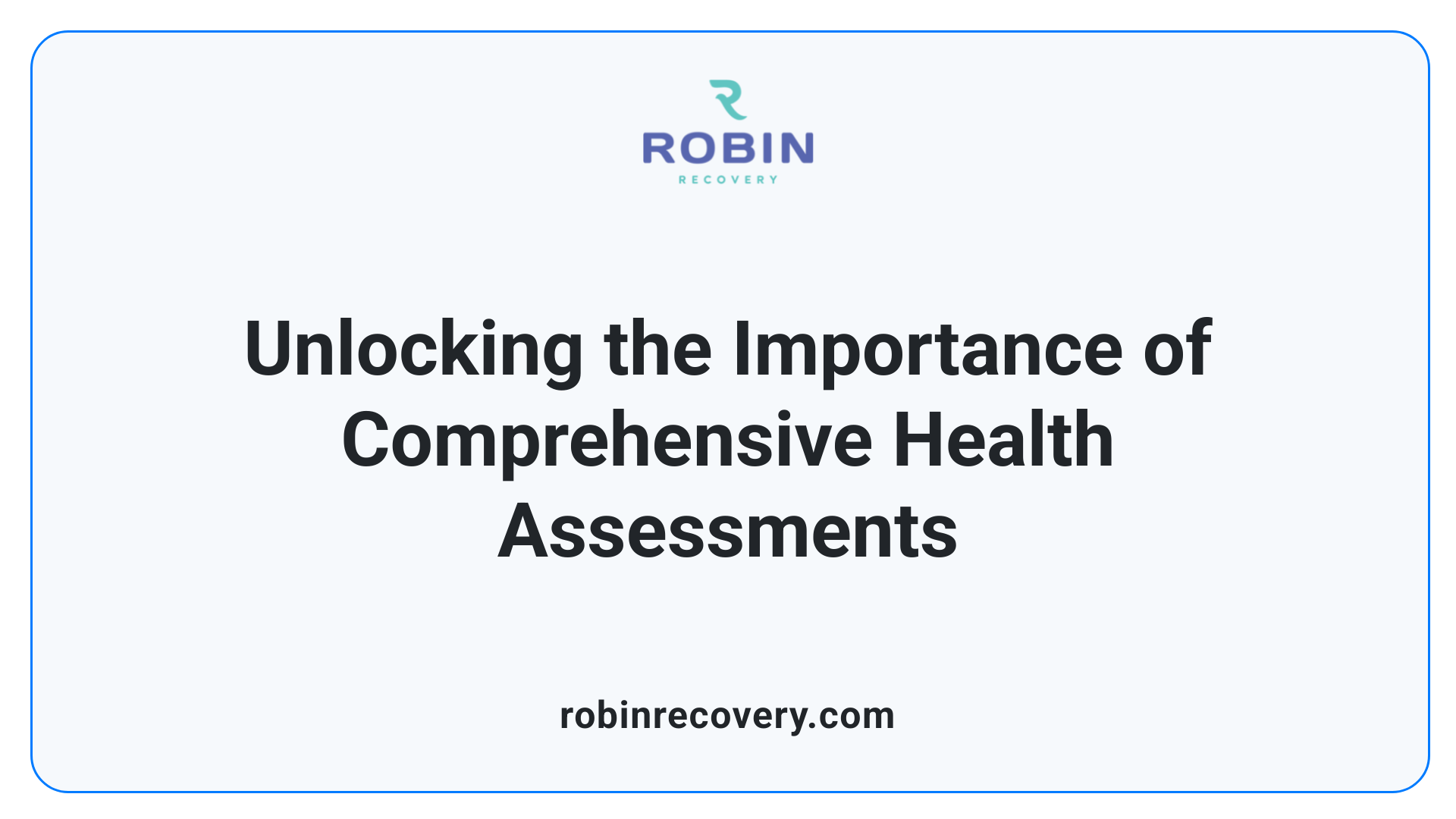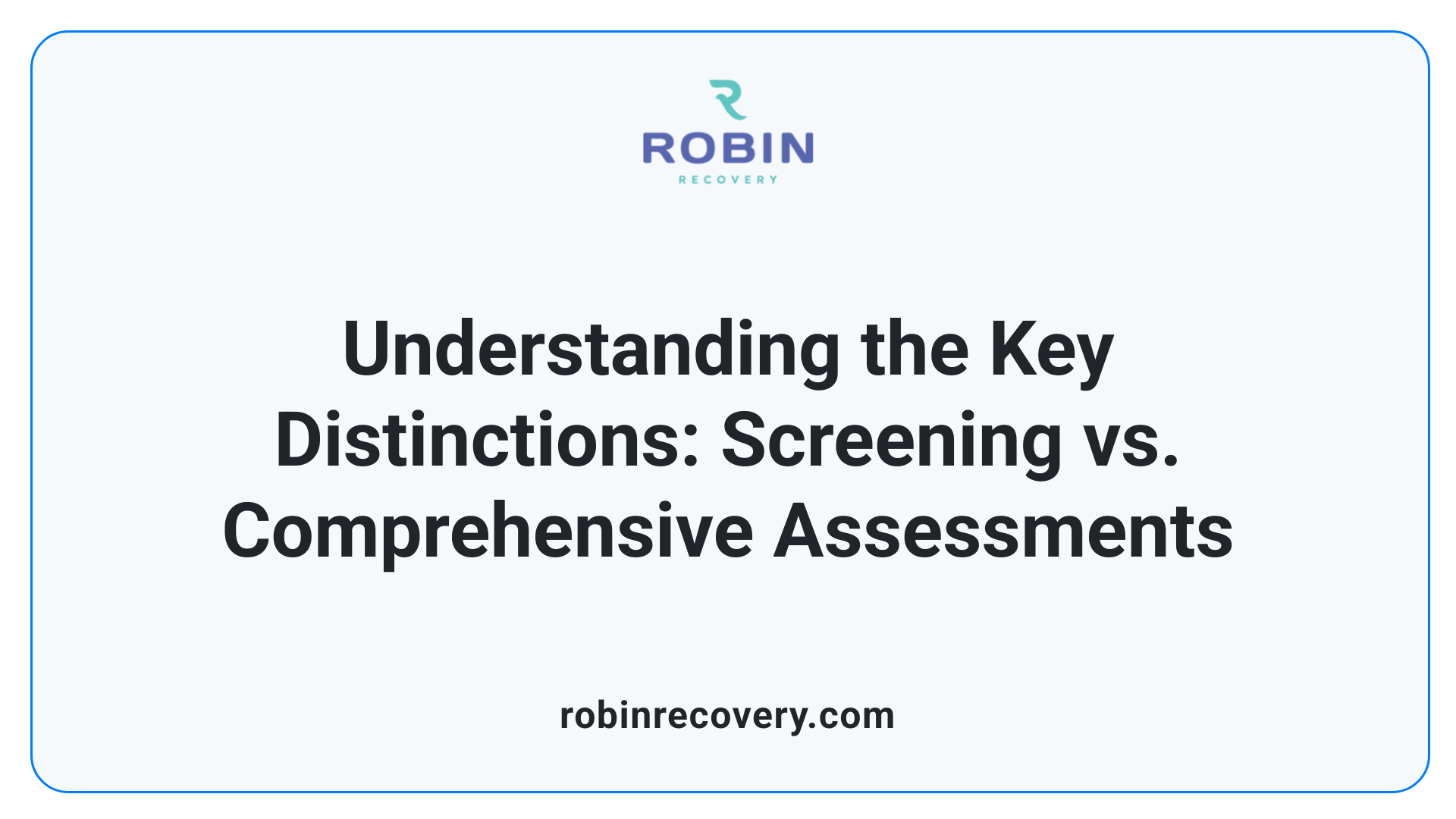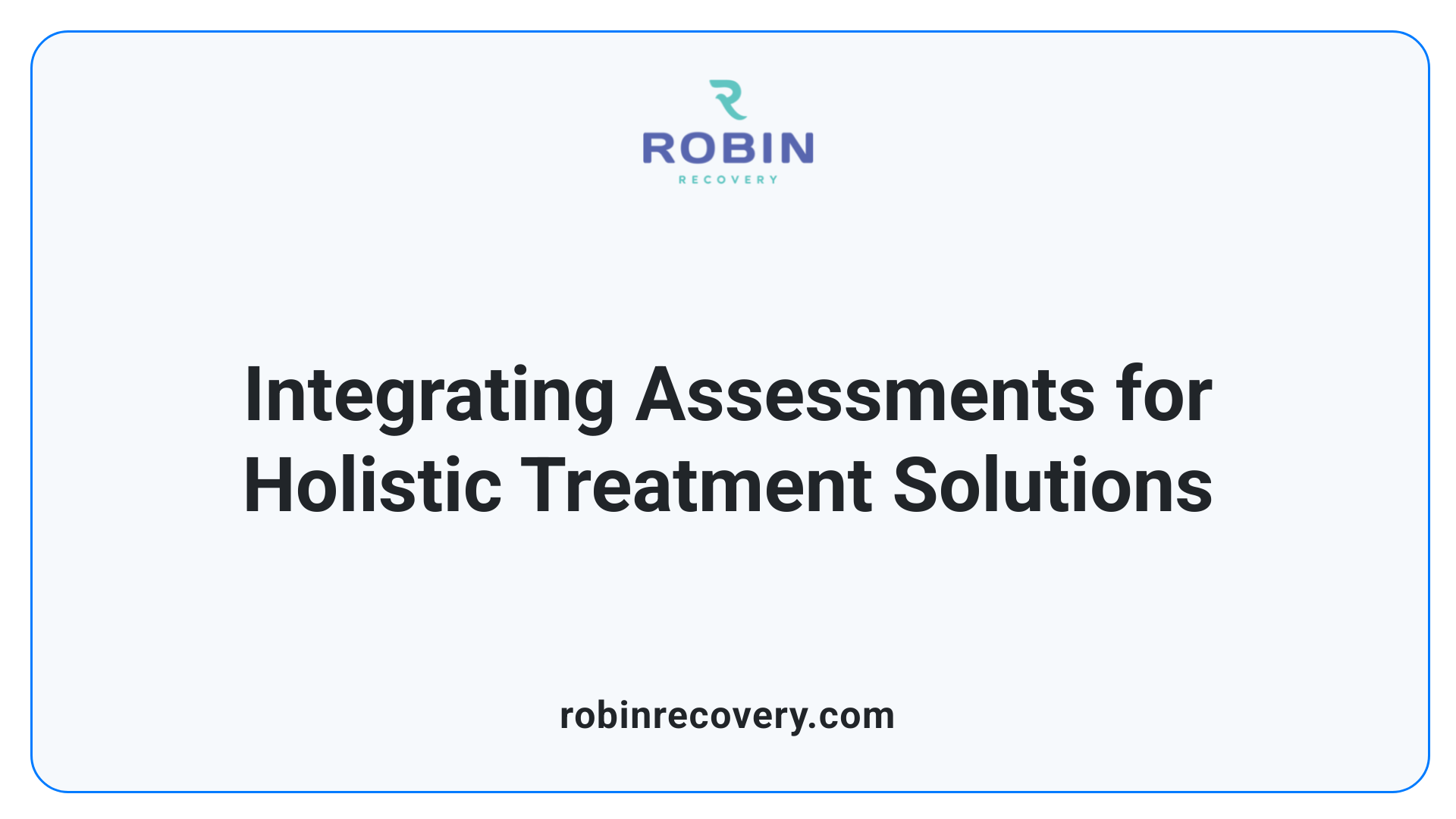The Role of Comprehensive Health Assessments in Treatment Planning

Understanding the Importance of Comprehensive Health Assessments
Comprehensive health assessments serve as an essential cornerstone in the development of effective treatment plans across various domains of healthcare. Leveraging a multifaceted evaluation approach, these assessments delve into the physical, mental, and socio-environmental aspects of an individual's health. By casting a wide net to collect and synthesize critical data, healthcare professionals can devise personalized strategies that address complex health challenges, from mental health issues to addiction and beyond. This process not only enhances diagnostic accuracy but also significantly impacts treatment outcomes, promoting a holistic healthcare strategy that benefits both patients and providers.
The Purpose and Scope of Comprehensive Health Assessments

What is the purpose of a comprehensive health assessment?
The purpose of a comprehensive health assessment is to evaluate a patient's complete health status, which includes physical, mental, lifestyle, and socioeconomic factors. This systematic process is critical to inform treatment strategies and ensure effective interventions are developed.
Components of Comprehensive Assessments
Typically, comprehensive health assessments involve several key components:
- General Health Survey: Gather information about overall health, lifestyle practices, and visible abnormalities.
- Detailed Medical History: Understanding current illnesses, past health issues, and medication use is vital for contextualizing a patient's health.
- Thorough Physical Examination: A head-to-toe examination to identify any physical conditions that might affect treatment.
This multi-faceted assessment provides healthcare providers with a complete clinical picture necessary for personalized care planning. The integration of these components lays the groundwork for tailored treatment plans, as it helps identify underlying issues, set realistic patient goals, and ensure that both mental and physical health aspects are addressed.
Data Collection in Patient Health
Accurate data collection is essential in comprehensive health assessments. Health professionals, including nurses and counselors, establish rapport with patients to encourage open communication, which enhances information accuracy. Effective data collection areas include:
- Drug Use History: Insights into substance use patterns and impact on health.
- Psychosocial History: Understanding family dynamics, support systems, and environmental factors.
- Medical History of Chronic Conditions: Noting chronic illnesses can help predict potential health risks.
Together, these elements help clinicians create structured treatment plans that promote the best possible outcomes for patients.
Differentiating Between Screening and Comprehensive Assessments

How does a comprehensive assessment differ from a basic screening in healthcare?
A comprehensive assessment is a detailed exploration of an individual's overall well-being. It encompasses thorough evaluations of physical, mental, social, and familial factors that contribute to health outcomes. In contrast, a basic screening offers a preliminary check intended to identify individuals at heightened risk for specific health issues, often conducted during routine healthcare visits.
Key Differences:
Aspect Comprehensive Assessment Basic Screening Depth of Evaluation Involves deep analysis, including clinical interviews and standardized tests. Typically brief, focusing on general evaluations. Focus Addresses identified issues from screenings, leading to potential diagnoses. Designed to catch potential risks early, often in asymptomatic populations. Methodology Uses diverse methods, integrating psychological tests and observations. Simple checklists or questionnaires. Outcome Informs tailored treatment plans and clinical decisions. Indicates the need for further evaluation.
In practice, screenings serve as initial filters to catch potential health problems early, while comprehensive assessments provide the necessary depth for informed clinical decision-making, ensuring holistic patient care. The latter is essential for developing effective and personalized treatment strategies.
The Role of Comprehensive Assessments in Treatment Planning

How assessments inform treatment planning
Comprehensive assessments are foundational in developing effective treatment plans for individuals facing mental health and substance use challenges. These evaluations provide a holistic view of a client's situation, encompassing psychological disorders, substance use history, medical conditions, and socio-environmental factors.
The assessment process typically includes various components such as an initial interview, medical evaluations, psychological assessments, and substance use evaluations. This multifaceted approach ensures that clinicians gather detailed information on the client’s psychological, medical, and social history, ultimately informing tailored treatment strategies.
Assessments offer crucial insights into underlying issues linked to addiction, such as trauma or unresolved grief, guiding targeted therapeutic interventions. As Tracie Keller emphasizes, ongoing evaluations are essential not only at the beginning but throughout the treatment journey. By continuously monitoring a client's progress, healthcare providers can make necessary adjustments to enhance recovery potential.
Furthermore, these assessments empower clients by involving them in the process of identifying goals and preferences, fostering collaboration between the counselor and the individual. This engagement often results in increased motivation and compliance with treatment plans.
In summary, comprehensive assessments guide the formulation of an effective treatment plan by illuminating the various factors affecting a client, thus facilitating tailored strategies that aim to address specific needs.
Preventing Misdiagnosis Through Comprehensive Assessments

Importance of Thorough Evaluations in Preventing Misdiagnosis
Conducting a comprehensive assessment is crucial in avoiding misdiagnosis, especially in children. This approach goes beyond singular measurements and integrates multiple dimensions of a child’s abilities, including cognitive functioning and academic performance.
How Comprehensive Tools Enhance Assessment Accuracy
Tools such as the WISC-IV (Wechsler Intelligence Scale for Children) provide a detailed evaluation by measuring various intellectual capacities through a series of subtests. This multidimensional strategy offers a more nuanced understanding of a child’s strengths and weaknesses, rather than relying on a single score, which might overlook important aspects of their capabilities.
In conjunction with cognitive evaluations, the WIAT (Wechsler Individual Achievement Test) assesses academic skills directly, complementing the insights gained from the WISC-IV. Together, these tools facilitate a thorough understanding of a child's needs, guiding precise diagnoses and targeted interventions.
Cultural and Contextual Considerations
Moreover, careful interpretation of assessment results, incorporating cultural and contextual factors, is essential. This approach prevents mislabeling or misunderstandings of a child's attributes, ensuring that the assessment process contributes to accurate diagnoses and effective treatment plans.
By prioritizing comprehensive assessments and using reliable tools, professionals can significantly reduce the risk of misdiagnosis and enhance intervention outcomes.
Implications for Individualized Treatment Plans
How comprehensive assessments impact individual treatment plans
Comprehensive health assessments play a crucial role in shaping individualized treatment plans. By thoroughly evaluating a patient's medical history, substance abuse issues, psychological factors, and personal circumstances, clinicians gain a deeper understanding of the unique challenges faced by each individual. Such insights allow for the development of a tailored care approach that addresses specific needs directly.
Identifying co-occurring disorders, unresolved traumas, and psychosocial influences is fundamental in this process. This detailed understanding enables the creation of targeted interventions, which significantly enhance the likelihood of successful recovery. Notably, when clients see their unique needs recognized, their engagement and motivation in the therapeutic process often increase, fostering a stronger commitment to their treatment.
Adaptation of treatment based on assessments
The adaptation of treatment plans is another critical aspect driven by ongoing comprehensive assessments. These evaluations are not a one-time event; they occur continuously throughout the treatment journey to monitor progress and make necessary adjustments. This dynamic approach ensures that treatment remains relevant and effective, aligning with the individual’s evolving circumstances, strengths, and challenges.
For instance, if an assessment reveals new issues or changes in a patient's life, counselors can modify treatment strategies promptly. This flexibility allows clinicians to respond to the individual’s feedback, reinforcing the importance of patient engagement in the treatment process. Ultimately, the integration of comprehensive assessments leads to better treatment outcomes, characterized by improved recovery rates and sustained patient satisfaction.
Enhancements in Mental Health Care Through Comprehensive Assessments
Role of detailed assessments in mental health
Comprehensive health assessments play a vital role in mental health care by facilitating accurate diagnoses and crafting personalized treatment plans. These assessments incorporate diverse elements such as initial interviews, psychological evaluations, and medical histories. By using a biopsychosocial framework, they not only identify mental health disorders but also reveal underlying issues like unresolved trauma or grief that may influence a person's well-being.
Tailored treatment plans arise from these assessments, addressing both mental health and substance use issues. The process involves collaboration between counselors and clients to set goals that reflect individual needs and circumstances. As emphasized by experts, this collaboration can strengthen trust and improve overall treatment outcomes.
Use of standardized tools and regular evaluations
Standardized tools, such as validated screening instruments, are crucial in conducting comprehensive assessments. They not only ensure consistent evaluations but also help in detailed tracking of patient progress over time. Regular evaluations allow healthcare providers to monitor treatment effectiveness and make necessary adjustments.
By integrating ongoing feedback from patients, clinicians can refine treatment strategies to better support recovery. This continuous loop of assessment and adjustment plays a significant role in enhancing mental health care—ultimately leading to better patient outcomes and quality of life.
Overall, the implementation of comprehensive assessments represents a major stride towards personalized and effective mental health care, equipping professionals with the necessary insights to guide their work.
Comprehensive Evaluations in Dual Diagnosis Treatment
Use of assessments in mental health and addiction
Comprehensive assessments are pivotal in dual diagnosis treatment, integrating evaluations of mental health, substance use history, and physical health. The holistic approach begins with initial interviews and medical evaluations, documenting valuable patient histories to inform treatment plans.
The assessment process must be thorough, not limited to identifying symptoms but should also probe into the underlying factors contributing to addiction. For instance, trauma or unresolved grief may surface during evaluations, paving the way for targeted intervention strategies.
Developing tailored treatment plans relies heavily on these assessments. They ensure that the interventions address both addiction and any psychological issues, enhancing the chances of successful recovery. Counselors actively involve clients in this collaborative planning, which helps in creating a trusting therapeutic relationship.
Evaluation of co-occurring issues
Understanding co-occurring disorders is essential for effective treatment in dual diagnosis scenarios. Comprehensive evaluations take a biopsychosocial approach, focusing on various aspects such as social support, community involvement, and cultural influences, which can significantly affect recovery.
Knowledge gained from assessments allows counselors to identify specific conditions influencing a patient's mental health and substance abuse. Regular follow-up assessments can track progress and adjust treatment plans, ensuring they remain relevant to the client’s evolving needs. This ongoing process is vital for crafting personalized care plans that resonate with the patient's unique circumstances and goals.
Integrated Evaluations for Addiction and Mental Health

Link between assessments and dual diagnosis treatment
Comprehensive assessments play a vital role in addressing the complexities of dual diagnosis, where individuals face both mental health and substance use disorders. This multifaceted evaluation entails several key components: an initial interview, medical evaluations, psychological assessments, and substance use history. By understanding a client’s background and individual circumstances, clinicians can identify underlying issues such as trauma or unresolved grief, which may contribute to addiction. Tailored treatment plans that emerge from these assessments enhance recovery prospects by addressing both addiction and various mental health issues.
Monitoring treatment progress
Ongoing evaluations through repeated comprehensive assessments are essential in tracking progress during treatment. As clients evolve, continuous assessment allows clinicians to fine-tune treatment plans to better align with the patient’s current needs and circumstances. This method ensures that therapists not only track improvements but also adjust interventions promptly to mitigate risks of relapse and promote sustained recovery. Thus, the assessment process becomes an ongoing dialogue, driven by both patient feedback and clinical observations, reinforcing the importance of a dynamic and individualized approach to care.
Utilizing Biopsychosocial Models in Comprehensive Health Assessments
Incorporating biopsychosocial models into assessments
Incorporating a biopsychosocial model into health assessments involves looking at biological, psychological, and social factors that influence a patient's health. Such a comprehensive evaluation helps clinicians gain a robust understanding of various aspects that affect individual well-being.
- Biological Factors: These include genetic predispositions, chronic illness, and current medications that may impact mental health.
- Psychological Factors: This entails understanding mental health history, including any trauma or emotional distress, which can influence patient outcomes.
- Social Factors: Assessing the patient's social environment, support systems, and cultural influences is crucial for tailoring effective treatment plans.
Understanding diverse patient conditions
The biopsychosocial approach particularly shines in recognizing the diversity in patient conditions. It facilitates individualized treatment by considering a person’s unique life circumstances, behaviors, and contextual challenges that contribute to their overall health.
For example, evaluations might reveal unresolved grief or trauma that underlies a patient's addiction, necessitating specialized therapeutic interventions. Ongoing assessments further ensure that evolving circumstances, such as changes in social support or emerging health issues, are integrated into the treatment plan for optimal care.
In summary, employing a biopsychosocial framework in comprehensive health assessments establishes a clearer picture of patients' needs, paving the way for personalized and effective treatment strategies.
Best Practices for Implementing Comprehensive Health Assessments
Guidelines and Common Practices for Assessments
Comprehensive health assessments play an important role in effective treatment planning. Here are some best practices:
- Initial Interviews: Start by conducting detailed interviews to gather the individual's story and unique experiences. This helps establish rapport and ensures accurate information collection.
- Use of Standardized Tools: Incorporate validated screening tools and assessment forms to maintain objectivity and consistency in evaluating mental health and substance use issues.
- Multi-Dimensional Approach: Assess various domains, including psychological, medical, social, and environmental factors to capture a holistic view of the patient’s condition.
- Ongoing Evaluation: Implement continuous assessments throughout the treatment process to monitor progress and adjust treatment plans as necessary for optimal outcomes.
Role of Healthcare Professionals in Executing Assessments
Healthcare professionals, especially nurses and counselors, are pivotal in the assessment process:
- Building Rapport: Establishing trust with patients is essential for obtaining honest and accurate information during assessments.
- Collaborative Treatment Planning: Engaging clients in the assessment process helps identify their goals and preferences, fostering a sense of ownership in their treatment plans.
- Critical Thinking Skills: Utilizing critical thinking aids in analyzing assessment data, enabling the creation of tailored care plans that meet individual needs and preferences.
- Ongoing Education: Professionals should pursue continuous education and peer consultations to adapt to evolving diagnostic criteria and enhance their assessment skills.
The Future of Comprehensive Health Assessments
Comprehensive health assessments are indispensable in today's healthcare landscape, offering insightful data that drives tailored treatment planning. As our understanding of health's complexity expands, these assessments will become even more pivotal in addressing multifaceted health issues from early childhood through older age. Incorporating a comprehensive evaluation into clinical practice not only supports accurate diagnoses but also empowers patients and practitioners to collaborate in achieving optimal health outcomes. Moving forward, fostering continued innovation, research, and education in assessment techniques will enhance their effectiveness and accessibility, ensuring that all individuals receive the personalized and holistic care they deserve.
References
- The Importance of Comprehensive Assessments
- Assessment, diagnosis and treatment planning: A map for the ...
- Assessment and treatment planning using the stepped care approach
- The Benefits of Comprehensive Assessment - CE-Credit.com
- Conducting a Comprehensive Assessment of Patients
- Comprehensive Health Assessment - University of New England
- Chapter 3—Screening and Assessment of Co-Occurring Disorders
- Comprehensive Evaluation And Treatment - Family Time Centers
- Why Comprehensive Psychological Services Are Essential Today
